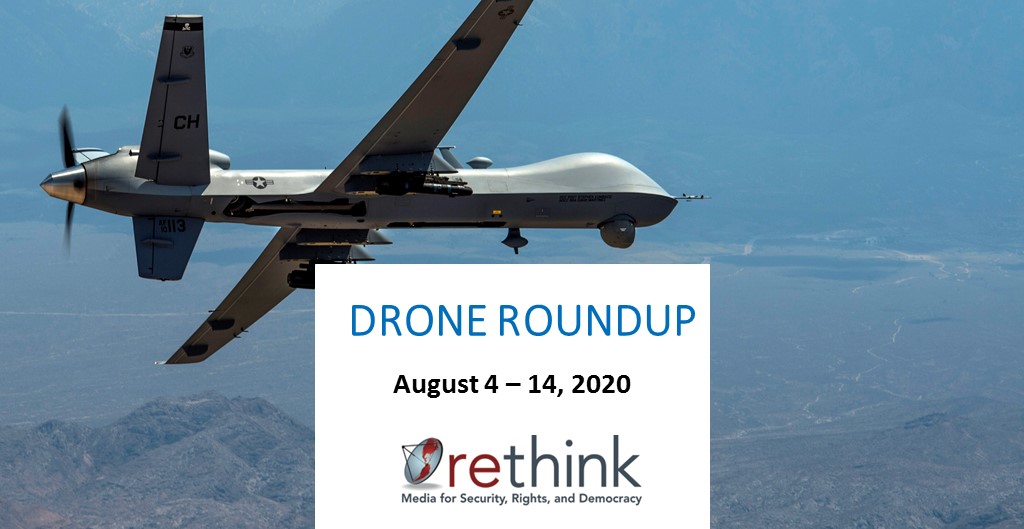Drone Roundup August 4 -14

This roundup, curated by ReThink Media, looks at how the media is talking about drone warfare (and related topics) and what stories are being told.
With little transparency from governments on this topic, this roundup aims to be as comprehensive as possible, identifying breaking news, trends, developing stories, or interesting narratives. Rethink Media also use media coverage to compile a snapshot of strikes each week. The short version can be read here.
A bipartisan group of U.S. senators introduced a bill that would ban the sale of large armed drones to all nations other than close U.S. allies. The legislation was crafted in response to the Trump administration’s move last month to circumvent a 33-year-old arms treaty and sell more large armed drones to foreign militaries. “If we allow Trump to start selling drones, we set a dangerous precedent that allows and encourages other countries to sell missile technology and advanced drones to our adversaries,” Sen. Chris Murphy (D-CT) and a sponsor of the bill, said in a statement. [NYT / Edward Wong] Under the bill, exceptions to the sales ban would include members of the North Atlantic Treaty Organization, as well as Australia, New Zealand, South Korea, Japan and Israel. [Reuters]
A new Mail & Guardian investigation can, for the first time, reveal where US special operators have been active on the African continent — and offer exclusive details about low-profile missions that have been largely kept under wraps. In 2019, US Special Operations forces were deployed in 22 African countries: Algeria, Botswana, Burkina Faso, Cameroon, Cape Verde, Chad, Côte D’Ivoire, Djibouti, Egypt, Ethiopia, Ghana, Kenya, Libya, Madagascar, Mali, Mauritania, Niger, Nigeria, Senegal, Somalia, Tanzania and Tunisia. This accounts for a significant proportion of US Special Operations forces’ global activity: more than 14% of US commandos deployed overseas in 2019 were sent to Africa, the largest percentage of any region in the world except for the greater Middle East. The US also deploys drones in their operations in Africa.
The U.S. Air Force this week concluded a test of tactics involving use of its highly classified RQ-170 surveillance drone with other stealth aircraft. [UPI / Ed Adamczyk] [The National Interest / Kris Osborn]
The United States is negotiating the sale of at least four sophisticated aerial drones to Taiwan for the first time. [Reuters / Mike Stone]
To counter China, the Trump administration has been laying the groundwork for new arms sales to India that go above and beyond what previous administrations considered, including longer-term weapons systems with higher levels of technology and sophistication, such as armed drones, according to the officials. “They’re going to want to provide India with armed [category-1] Predators,” said a congressional aide familiar with the matter, referring to MQ-1 Predator drones that can carry more than 1,000 pounds of bombs and missiles. The aide said the State and Defense Departments had been pushing for a transaction. “Part of the calculation behind the policy change was to free themselves up from the international and multilateral constraints so they could increase the sales pitch to India on [drones],” the aide added. [FP / Robbie Gramer and Jack Detsch]
Relatedly, India approved a plan to weaponize its Israeli-supplied Heron drones. If the plan comes to fruition, India would join a small but growing number of states operating armed drones. [India Today]
The UK’s Maritime and Coastguard Agency (MCA) awarded an Israeli defence company with a contract worth almost £1 million to demonstrate and develop unmanned aerial vehicles – or drones – to enhance coastal surveillance operations. [WIRED / Gian Volpicelli]
The Canadian government is forging ahead with plans to set up its own fleet of armed drones, joining several of its NATO allies. Ottawa is looking for an unmanned aircraft that can reach anywhere in its massive territory, keep an eye on its territorial waters, and, when necessary, acquire targets and fire missiles. It looks increasingly likely that Canada will be buying something resembling the MQ-9 Reaper. [VICE / Justin Ling]
On Tuesday, Iraq cancelled the Turkish defense minister’s visit after a Turkish drone strike in northeastern Iraq killed two high-ranking Iraqi officers and the driver of the vehicle they were in. [Al Arabiya] Ramzy Mardini, an associate at the University of Chicago’s Pearson Institute, told Al-Monitor, “The fact that Iraqi border personnel were killed suggests that the Turkish drone strike occurred without the approval of Baghdad, thereby incurring domestic audience costs for the prime minister. To protest without taking some retaliatory action would undermine his credibility and highlight the reality that he isn’t capable to exercise his authority. The visit of the defense minister is now too politically costly.” [Al-Monitor / Amberin Zaman]
Libya has been transformed this year into something of an air warfare laboratory, begging the question: What exactly is going on, who is winning and what has this conflict taught generals about modern air combat? [Defense News / Tom Kington]
Iraq is facing a new security challenge with its lack of control of drones, which have been increasingly used in the past months. [Al-Monitor / Mustafa Saadoun]
Human Rights Watch reviewed the policies of 97 countries that have publicly discussed killer robots since 2013 and found that 30 countries have now expressed a desire for an international treaty introduced which says human control must be retained over the use of force.
Click here to read the full Drone Roundup.

